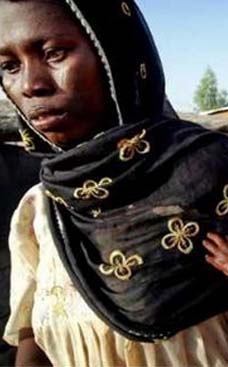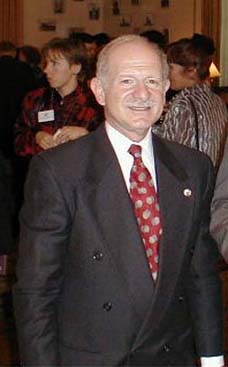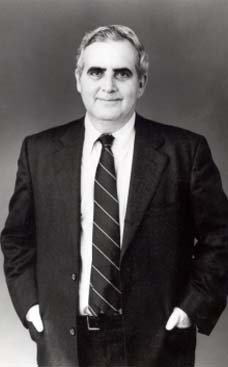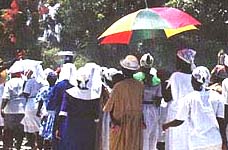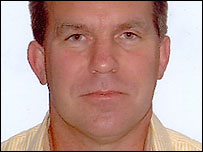
In many ways the world has been kind to southern Sudan for a long time. As the struggle for liberation was going on, millions of dollars were spent sending relief items to those left in dire need as a result. I really hope that now with the new government of national unity in place, there is a window of opportunity to really make a difference for the people of Sudan.
Kenya RPCV Bill Lorenz of the International Organisation for Migration (IOM) helps thousands of Sudanese trek home to Raga in the south-west, following a deal to end a 21-year war
Sudan trek diary III: Setting up camp
Bill Lorenz
Bill Lorenz of the International Organisation for Migration (IOM) is keeping a diary for the BBC News website as he helps thousands of Sudanese trek home to Raga in the south-west, following a deal to end a 21-year war.
He is transporting the most vulnerable on trucks through forests and swamps in a race against time, as the heavy July rains are due.
Monday 11 July
I have a bout of malaria and am not feeling great. Hope the medication kicks in soon.
We arrived at the camp at Yakap this morning - finally. It's much drier here, much to my relief. There are big mahogany trees and other hardwoods here.
Trekkers building a bridge in Sudan
Trek in pictures
People tell me the forest is thinning. But I don't see it. It still looks dense. The only thing I do notice is that the soil is sandier and the temperature is cooler.
At least 400 people are here already, most of them from the advance group of tree markers and cutters. They've already been here two weeks, building the bridge we've just crossed. I don't know how they did it.
One of the trees used was several feet in diameter and big. All they have to cut with are axes. I have no idea how they moved it into place afterwards.
Tents
People are camping along the road that has already started to be built from Yakap towards our final destination - Deim Zubeir - 80 km away.
On the one side of our tents is Hassan, his two wives and children. To the other, there is Howiya, her sister and two children.
We've crossed all the major rivers now.
Hassan is our handyman. He collects water for us IOM staff and sets up our tents. Howiya cooks us meals of pasta and ugali, which is like porridge made of maize meal.
There are strict rules at campsites. You go up river for collecting water for drinking and cooking. Down river for doing laundry.
Where tents are, trees and grasses have been cut right back. It allows us to see anything that moves, especially snakes.
Behind this camp, there are still another three with people still in them. The majority of the 5,000 people are making this journey home. The trucks are moving back and forth between them to move those that can't make it on foot further ahead.
Celebrations
Resiki, the commissioner as he is called, a former Sudan People's Liberation Army (SPLA) commander from Raja leading this group back, is anxious to get people together into a tighter group.
Mother and baby
Children have been born during the trek
He's not sure whether local militias at Deim Zubeir are really OK with this return, and wants people to stay close together in case.
Today, there are celebrations in our camp to mark the inauguration of the new government of national unity in Sudan. The tree cutters are taking a well-deserved breather. Work on the road resumes tomorrow.
There have been other celebrations too. Another two babies have been born in the past few days.
The latest addition, a baby girl and her mother Satma Andel were helped by this amazing woman I've only just met.
Sidona Musa, a midwife, is in her late 60s and still going strong. She tells me proudly in her quite good English that she has been working as a midwife since 1972.
Another potential problem facing us as we start heading towards the savannah: the dreaded tsetse fly
The day's holiday in the camp gives me a moment to pause and reflect. We've crossed all the major rivers now.
People from the UN are flying to Deim Zubeir tomorrow to discuss the group's arrival with the authorities and it seems the people there are preparing for it.
I am still trying to organise another air food drop for the end of this week.
I start to think that things will go more smoothly now. But then I hear we have another potential problem facing us as we start heading towards the savannah: the dreaded tsetse fly that causes sleeping sickness.
Read Bill's previous entry
Below, Bill answers some questions sent in by BBC News website readers.
Mik Allor in the US wants to know: If you know of any way, through a programme or an organisation, that I could become involved in and help these people, it would be amazing.
There is a window of opportunity to really make a difference for the people of Sudan
If you are a young American, the best thing is to do what I did when I was younger and join the Peace Corps, a voluntary organisation. It is a good way to start.
Jennifer Rossiter in China asks: How do you feel about the world response to what has happend in Sudan and what they are doing, or not doing now?
In many ways the world has been kind to southern Sudan for a long time. As the struggle for liberation was going on, millions of dollars were spent sending relief items to those left in dire need as a result. I really hope that now with the new government of national unity in place, there is a window of opportunity to really make a difference for the people of Sudan.
The kindness from before needs to stretch to the crucial phase of development. People really need help and assistance from now onwards. Some, like the group in this trek, are going back to their homes and there is nothing for them to go back to, to restart their lives. Humanitarian organisations, including IOM, don't have the resources to help at this crucial phase.
Angel Young in the US asks: What is happening to the children on this journey? Do you sense they are becoming hopeless, or do the children seem optimistic?
Actually the children seem the most resilient of all. I am amazed by them. They find the most incredible things to play with. They make balls out of rolled up leaves and entertain themselves. They are actually holding up much better than their parents.
Sabrina Hobran in the US asks: How do you adjust to a normal life after this sort of work? How do you stay connected to family and explain to a spouse why you do what you do?
Well I've been doing this kind of work since the 1990's. I take pictures and when I get home, I show them to my family and talk to them. Obviously, some family don't comprehend the experiences. But is a recognised gap between us. But I also don't do this all the time. Most of my work is done in an office in Nairobi so it allows some family life, but yes you are right, it is tough.
John V Carey in the US asks: Could you be a bit more specific on what agencies we can financially support so that aid can be quickly got to the people?
There are many organisations working in southern Sudan including IOM. They include several of the UN agencies such as OCHA, WFP, UNHCR and then there are organisations such as CARE and International Rescue Committee and World Vision to name but a few.
Humanitarian organisations across the board have found it hard to raise the money for their programmes in southern Sudan. In IOM's case, we need $21 million for a programme to help IDPs return home in southern Sudan but as yet have no money. Our funds for operations in the south will run out in September.
Adam B Smith in the US asks: Once the people reach Raga, what promises of subsistence, education, and employment await them there?
At the end of their journey, all the IDPs will stay at a camp at Bile for two to three months. This will allow them to organise themselves before going to their real homes and to help them integrate. They will get reintegration assistance here such as food, seeds, agricultural tools, non-food items. It is important that they have this time at the camp because of this assistance they will receive. Once they have returned home and reintegrated, it won't be possible for them to get such help.
In terms of livelihood, most will go back to farming. People on this journey are already carrying with them seeds for cash crops such as sorghum, ground nuts and cowpeas, crops which weren't grown in their area before. There are even five pigs with the aim of introducing pig farming, despite the objections of the Muslims among the group.
As far as education is concerned, there are schools already there in the communities at which the children will be able to enrol.
Jane Joseph in the US asks: Is this the only group coming back home? What about the people in East Africa?
There are different types of people movement as far as southern Sudan is concerned. There is the return of refugees living outside of the country. IDP movements between different parts of the south, between north-south and between south-north. As far we know, this is the first substantial south-north or north-south movement. As for the question of refugees, it is UNHCR which will deal with that. I am not sure when refugee returns will take place exactly.
M Naseer in the US asks: What resources are you referring to when you say we need help? Africa is a complex mystery to many. Without knowledge of how things work, the resources used, one feels clueless, perhaps even helpless. What can one do to make a difference in your mission? Is monetary aid the best form of help?
Usually monetary assitance is the best form of assistance because it is a more cost effective way of delivering assistance and is good for the local economy. If you take, for example, someone sending 10 kg of clothing in response to a disaster, the cost of shipping and transport to exact location is much, much higher than buying the same amount of clothing on the local market, which is also more likely to be the right kind of clothing for the environment and good for local business. So yes, I would say monetary aid is usually the best form of help.
Peter McGuire in Australia asks: What language groups (Dinka, Nuer etc) are making the trek? Are they going together in groups, or separately? What is their destination in Sudan? Will they go back to the district where they lived previously? Considering the swampy nature of the landscape, with mosquitoes etc, are there health hazards?
Most of the 5,000 are Arabic speakers. There are 13 tribes in all. All the tribes are travelling together, mixing with each other and not travelling separately. They are not the large tribes such as Dinka etc, but more the smaller ethnic groups such as Krish, Bilanda and Yulu.
Their destination is Raja and Wau in Western Bahr el Ghazal province where they lived previously. They will get there after they have spent a few months in a transit camp at Bile.
Yes, there have been health hazards such as malaria, diarrohea, acute respiratory infections but considering the number of people travelling and the length of the journey so far (nearly three months) the people are in remarkably good shape. The IOM doctor says the level of illness is not high. Now we are travelling out of the swampy areas, so there are less mosquitoes. But when we get to the savannah, then we will have to face the tsetse flies which are responsible for sleeping sickness.







